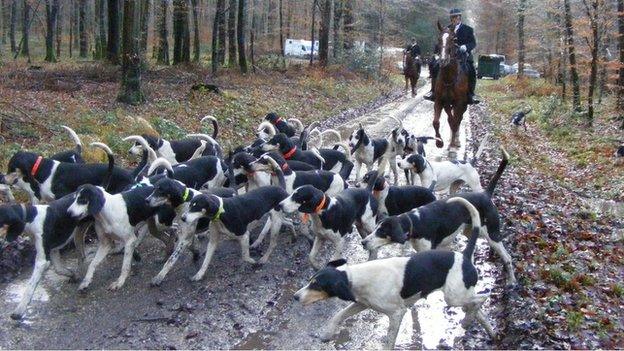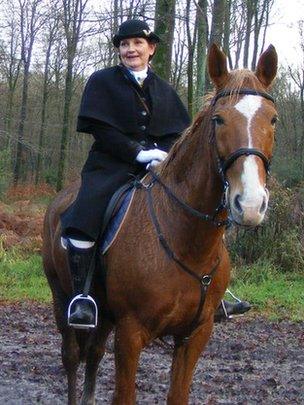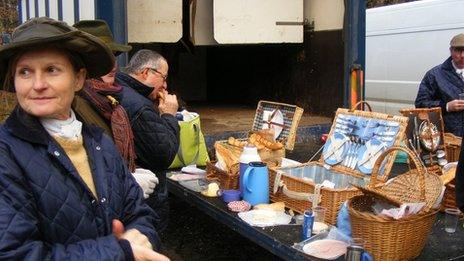How long will France hunt with hounds?
- Published

Hunting with dogs is banned in much of Europe, including the UK, but in France the tradition is alive and well. Hunters face no challenge from politicians or animal-rights activists - but how long will this last?
As Hugues Lamy gets out of his car and into his boots in a forest clearing in Normandy, the heavens open.
But Mr Lamy will not let bad weather spoil the thrill of riding along as a pack of hounds hunts down a roe deer.
"We come here rain or shine," he beams. "This evening the tea, or the Scotch, will taste much better!"
Mr Lamy is one of a dozen members of the local hunt who have gathered at the Foret d'Eu. They put on quaint livery, saddle horses, greet each other and, as the frigid rain turns to hail, prepare for another day in the open air.
As winter sports go, hunting with hounds may not be as popular as skiing in France, but it is much more ancient.
While several other European countries, including Germany and the UK, have banned hunting with hounds, in France it continues unhindered - more than 400 hunts boast 10,000 members nationwide.
BBC News spends a day with a hunt in the Foret d'Eu in France
They face little or no challenge from the animal-rights lobby. Saboteurs - who obstruct England's remaining hunters - are a rarity in France.
"We have never had any activists here," says Mathieu Berge, who has been the master of the Foret d'Eu hunt since the 1980s.
Only one hunt in the whole of Normandy has been disrupted over the 10 years Berge has served as regional head for France's hunting association. "On that occasion the gendarmes quickly removed the troublemakers," he says.
The hunt begins with Berge gathering participants around him, in full regalia despite the mud. After a short briefing, the master gets on his horse, blows a fanfare on his horn, and leads the hounds into the woods with others trotting after him.
Like traditional hunting in the UK and elsewhere, "chasse a courre", as the French call it, has strict rules. There are no firearms. The hunters' role is limited to observing, typically on horseback, and sounding horns when they spot an animal.
But French-style hunting also has its own peculiarities. While the British chase mostly foxes across fields, the French focus on boar or deer in forests.
The riding experience differs as a result. In Britain the thrill of jumping over fences in open countryside is central to hunting.
Rides through French woodland are "nothing like as demanding", says Joss Hanbury, a Leicestershire hunter with longstanding links to France. "Over there it is much more about pageantry than the excitement of the chase."
Philippe Baledent, one of the Foret d'Eu hunters, concedes the point. "You must be a very good rider to hunt in England," he says. "It's like steeplechase."
But at 83, Baledent enjoys the sedate pace of a French hunt. "In France we are lucky enough to have magnificent forests. Riding through these woods is wonderful."
Another distinctive feature of a French hunt is the sound the pack makes. French hounds are renowned for their deep voices.
Hunter Bertrand de Thezy is clearly thrilled by the howls that resonate through the woods: "They've picked up the trail of a roe deer. This is what I call music!"
In France as elsewhere, hunting with dogs is widely perceived as an aristocratic pursuit. It used to be a favourite royal pastime. Until the 1990s, French presidents entertained foreign leaders by taking them on shoots.
But hunting with hounds is no longer the preserve of the rich, says Mathieu Berge. He is no aristocrat himself - he runs a small hunting gear business and volunteers as master of the hunt he set up in the 1980s.
"We have farmers, factory workers, and even unemployed people," he says.
The full annual subscription is 1,700 euros (£1,400, $2,200) - "the equivalent of a week's skiing holiday," says member Gontrand Routier, a self-employed electrician.

The four-wheel drives and horse vans parked in the clearing suggest members are well-off. But the presence of followers indicates the sport does have wider appeal.
Bernard Leblond, a retired metal worker who lives 25km (15 miles) from the forest, has braved the cold weather to come on his moped.
"I have attended hunts here for the past 10 years," he says. He typically hitches a ride with another spectator, or follows on foot.
"What excites me is listening to the hounds. It's beautiful," he adds.
After the hunting ban in England and Wales was passed in 2004, there was speculation in the UK that many might travel to France to hunt.
But this has not happened - not even in Normandy, which lies a short hop away from Kent. "We have seen very few English hunters," says Berge. "It was not like the invasion we had when the British came over to buy houses."
Different hunting traditions are one reason. "We've had little or no real contact with French hunting because they're not fox-hunters," says Jamie Hawksfield, who helps organise hunts (no longer for foxes) in West Sussex.

There has been no talk of anti-hunt legislation since the 1980s
Moreover, hunts operate differently on both sides. In Britain, anyone can join by paying a fee on the day. French "equipages", by contrast, are close-knit groups where members pay a yearly subscription to attend every hunt. Casual attendance is not encouraged, Berge says.
Although British and French hunters have not been brought closer together by the hunting ban, there have been contacts between them for centuries - notably exchanges of hounds.
Laurent Sainsot, a Paris-based estate agent who hunts on both sides of the Channel, regularly collects surplus fox-hounds from his English contacts, and finds them excellent at adapting to French conditions.
"Once they learn to pick up the scent of boar, they no longer want to chase anything else," he says.
Conversely Leicestershire master Joss Hanbury says he has been "very impressed so far" with the puppies his hounds have had with a couple of French females.
But the 2004 Hunting Act, Sainsot says, did have an effect on French hunters - making them more aware of the long-term challenges they face.
Hunting with dogs is regularly condemned by France's animal-rights lobby. Herve Belardi of the Societe Protectrice des Animaux calls it "an antiquated pleasure".
"The kill itself is gratuitously cruel," he says. "The animal is harried to exhaustion, and then it is either shredded by the hounds or has its throat ritually slit."
Armand Farrachi, who heads the Collective for the Abolition of Chasse a Courre, rejects the hunters' contention that the sport reproduces the natural interplay between wolves and prey.
"Wolves are not bred and trained to track down quarry, and transported to forests by van," he says.
Of course, even Mr Farrachi admits that a UK-style ban - with hounds only allowed to chase artificial scents, not live animals - will not happen in France any time soon.
Hunters are a formidable political force in a country where urbanisation came relatively late and city-dwellers remain close to their ancestral roots. "They are on company boards and in the corridors of power," he says.
In the 1980s a new Socialist government, under President Francois Mitterrand, moved to outlaw hunting but the plan was quickly shelved.
More recently, inspired by Britain's effective "saboteur" movement, Farrachi's group tried to introduce similar tactics to France. But French authorities - not generally known for cracking down hard on radical protesters - responded with vigour.
In 2010 "obstruction to hunting" became an offence liable to a 1,500-euro fine (£1,200, $2,000). "At the slightest whiff of trouble they call us terrorists," says Farrachi.
The main worry for France's hunters, Sainsot contends, is not the animal-rights lobby but a creeping "societal threat" in a city-dominated world.
Eventually, he says, the French could become as disconnected from country life as the British are now.
But Sainsot remains hopeful. By remaining united with France's wider hunting community - which at 1.3 million strong is the largest in Europe - hunters with dogs will face the down the threat, he says.

Here in the Foret d'Eu, few appear concerned about the future of hunting.
As people return to the clearing, the sun finally comes out and so do the picnic baskets.
Like most social gatherings in France, this one concludes with food and wine.
Everyone is happy, even though the deer eluded the pack - as is the case most of the time, as hunters like to remind their critics.
"Today the deer won," Hugues Lamy smiles. "We lost, but we had a great day."
You can follow the Magazine on Twitter, external and on Facebook, external